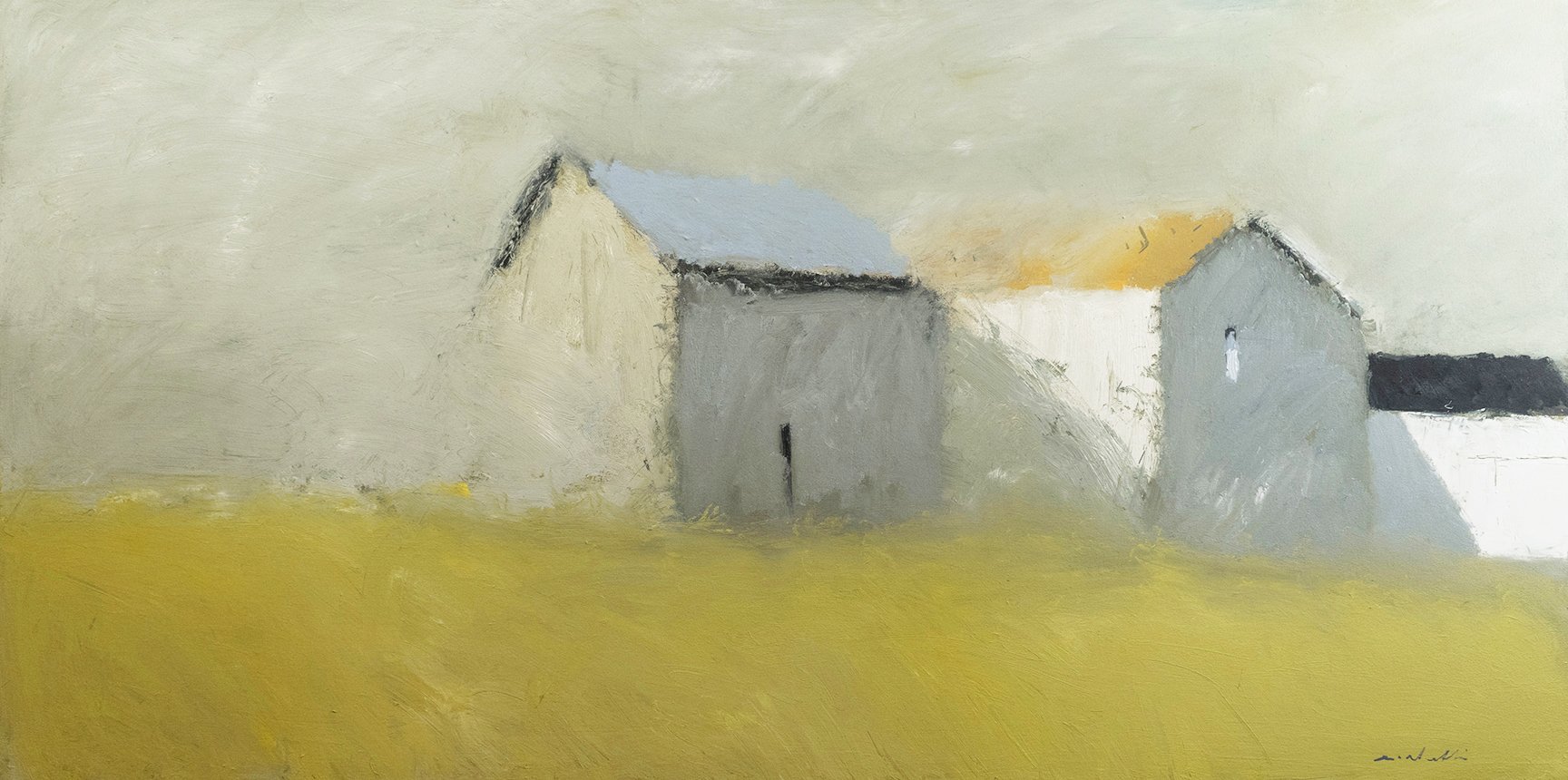Published January 14, 2023 by Helen Kachur
Courtesy of The Art Guide
theartguide.com/landscape-artist-victor-mirabelli
Victor Mirabelli, White Shadow, 36 x 72 inches, Oil on Canvas
LANDSCAPES – ABANDONING TRADITION
“Boundless” is the best description for the landscape work of our new Feature Artist, Victor Mirabelli. Both in creative design and imagery, Victor’s paintings are of vast open landscapes and endless creativity.
Using his trademark method of color restraint and localized placement of highlights, artist Victor Mirabelli has developed a tradition of distinctive rural landscapes. His work focuses on rendered high key components emersed in the suggestion of a weather-like atmosphere. Victor achieves the sky effect through careful attention to composition, placement of the solid objects and highlights that cut across rich open spaces of color to reveal the physical elements of form, texture and shadow. Moving from deep tonal areas to compressed bright values, the artist relies on familiarity of shapes to unify building compositions and foliage in a solidly painted foreground strip of land mass. His innovative use of this technique invites the viewer to study one of the most elusive of artistic concepts; the air that separates, laden in moisture and vibrant in light.
Originally from the Pacific Coast, Victor Mirabelli’s artwork reflects early childhood impressions of spacious landscapes fixed in the vast open plains of North America. His art education began at the Burnley School of Professional Art in Seattle, Washington, until eventually moving to the New York area where he currently resides. Victor’s study of art history and paintings of the East Coast, Hudson River School of Art, influenced the expansiveness of his own landscape paintings, considered to be contemporary, modern works. However, unlike the New York artists, Victor uses a reduced color palette and composition, to create sceneries of open fields dotted by structures that reflect upon a glimpse across a rural horizon or quiet moment while traveling about the New England countryside.
“… most elusive of artistic concepts; the air that separates, laden in moisture and vibrant in light.”
Victor Mirabelli, White Shadow, 30 x 30 inches, Oil on Canvas
Victor describes his painting method as built layers of pigment applied and mixed directly on canvas in a wet-on-wet technique. Using rapid directional brush movement, he fills the depth of large open space with layers of blended color. His fast pace scumbling seems to then abruptly stop. To some extent, the sudden break in action is detected on canvas and invites the viewer to step a bit closer in search of Victor’s process, as only then patterns and color transitions slowly emerge. Through thickly painted atmosphere, rectangular structures of limited detail appear, both settled and timeless in their surroundings. Traditional building shapes then take form in a balanced composition of warm sunlit groupings.
For years, Victor relied on the Abstract painting practice of adding or subtracting subject from his canvas arrangements. He continues in using this method to further develop a highly simplified landscape of visual dialogue between the placement of compositional elements. Evolving from patterns of color, basic forms of massed objects explore the sharp-edges of manmade buildings at contrast to softly muted foliage and atmosphere. Random brush gestures then model his painting process and create structures surrounded by foliage that appear fresh and harmonized through value changes.
Victor Mirabelli, Between Earth and Sky, 24 x 30 inches, Oil on Canvas
“… rectangular structures of limited detail appear, both settled and timeless in their surroundings …Traditional building shapes are then revealed in a balanced composition of warm sunlit groupings.“
Victor Mirabelli has experienced national acclaim for his paintings of the rural Northeast open fields and farmland. He has exhibited extensively in both solo and group juried shows. Today, private collectors throughout the US hold his artwork in their collections. He has served as a guest lecturer and juror for many art organizations and competitions. Mirabelli is a member of the Salmagundi Club, New York, NY; the Edward Hopper House, Nyack, NY; and the Garrison Art Center, Garrison, NY. He has been an associate member of the Northeast Watercolor Society, a member of the Catskill Art Society and the Kent Art Association, and a sustaining associate member of the American Watercolor Society.




